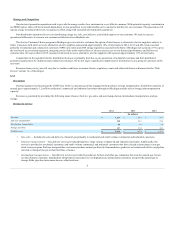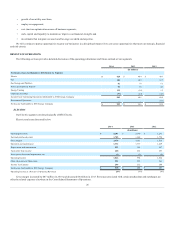DTE Energy 2014 Annual Report Download - page 19
Download and view the complete annual report
Please find page 19 of the 2014 DTE Energy annual report below. You can navigate through the pages in the report by either clicking on the pages listed below, or by using the keyword search tool below to find specific information within the annual report.
Uncertainty around future environmental regulations creates difficulty planning long-term capital projects in our generation fleet and gas distribution
businesses. These laws and regulations require us to seek a variety of environmental licenses, permits, inspections and other regulatory approvals. We could
be required to install expensive pollution control measures or limit or cease activities, including the retirement of certain generating plants, based on these
regulations. Additionally, we may become a responsible party for environmental cleanup at sites identified by a regulatory body. We cannot predict with
certainty the amount and timing of future expenditures related to environmental matters because of the difficulty of estimating clean-up costs. There is also
uncertainty in quantifying liabilities under environmental laws that impose joint and several liability on potentially responsible parties.
We may also incur liabilities as a result of potential future requirements to address climate change issues. Proposals for voluntary initiatives and
mandatory controls are being discussed both in the United States and worldwide to reduce greenhouse gases such as carbon dioxide, a by-product of burning
fossil fuels. If increased regulation of greenhouse gas emissions are implemented, the operations of our fossil-fuel generation assets may be significantly
impacted. Since there can be no assurances that environmental costs may be recovered through the regulatory process, our financial performance may be
negatively impacted as a result of environmental matters.
Future environmental regulation of natural gas extraction techniques including hydraulic fracturing being discussed both at the United States federal
level and by some states may affect the profitability of natural gas extraction businesses which could affect demand for and profitability of our gas
transportation businesses.
Operation of a nuclear facility subjects us to risk. Ownership of an operating nuclear generating plant subjects us to significant additional risks. These
risks include, among others, plant security, environmental regulation and remediation, changes in federal nuclear regulation and operational factors that can
significantly impact the performance and cost of operating a nuclear facility. While we maintain insurance for various nuclear-related risks, there can be no
assurances that such insurance will be sufficient to cover our costs in the event of an accident or business interruption at our nuclear generating plant, which
may affect our financial performance. In addition, while we have a nuclear decommissioning trust fund to finance the decommissioning of our nuclear
generating plant, there can be no assurances that such fund will be sufficient to fund the cost of decommissioning.
The supply and/or price of energy commodities and/or related services may impact our financial results. We are dependent on coal for much of our
electrical generating capacity. Our access to natural gas supplies is critical to ensure reliability of service for our utility gas customers. Our non-utility
businesses are also dependent upon supplies and prices of energy commodities and services. Price fluctuations, fuel supply disruptions and changes in
transportation costs could have a negative impact on the amounts we charge our utility customers for electricity and gas and on the profitability of our non-
utility businesses. We have hedging strategies and regulatory recovery mechanisms in place to mitigate some of the negative fluctuations in commodity
supply prices in our utility and non-utility businesses, but there can be no assurances that our financial performance will not be negatively impacted by price
fluctuations. The price of energy also impacts the market for our non-utility businesses that compete with utilities and alternative electric suppliers.
The supply and/or price of other industrial raw and finished inputs and/or related services may impact our financial results. We are dependent on
supplies of certain commodities, such as copper and limestone, among others, and industrial materials and services in order to maintain day-to-day operations
and maintenance of our facilities. Price fluctuations or supply interruptions for these commodities and other items could have a negative impact on the
amounts we charge our customers for our utility products and on the profitability of our non-utility businesses.
Adverse changes in our credit ratings may negatively affect us. Regional and national economic conditions, increased scrutiny of the energy industry
and regulatory changes, as well as changes in our economic performance, could result in credit agencies reexamining our credit rating. While credit ratings
reflect the opinions of the credit agencies issuing such ratings and may not necessarily reflect actual performance, a downgrade in our credit rating below
investment grade could restrict or discontinue our ability to access capital markets and could result in an increase in our borrowing costs, a reduced level of
capital expenditures and could impact future earnings and cash flows. In addition, a reduction in our credit rating may require us to post collateral related to
various physical or financially settled contracts for the purchase of energy-related commodities, products and services, which could impact our liquidity.
17
























